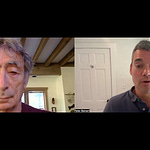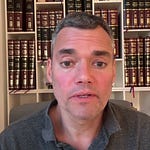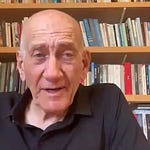Our Zoom call this week will be at the usual time: Friday at Noon EST.
Our guests will be James Zogby, President and Co-Founder of the Arab American Institute, and Abdelnasser Rashid, a Palestinian-American State Representative from Illinois. We’ll talk about how the war in Gaza is affecting Arab Americans and whether they will vote for Joe Biden this fall.
Paid subscribers will get the link this Tuesday and the video the following week. They’ll also gain access to our library of past Zoom interviews with guests like Rashid Khalidi, Thomas Friedman, Ilhan Omar, Benny Morris, Noam Chomsky, and Bret Stephens.
There will be no newsletter on Monday, February 19 or Zoom interview on Friday, February 23.
Sources Cited in this Video
Benjamin Netanyahu orders the Israeli military to make plans to invade Rafah.
Edward Kaplan’s biography of Abraham Joshua Heschel, Spiritual Radical.
I searched the following X (Twitter) accounts (@AIPAC, @ADL, @AJCGlobal, @StandWithUs, @OrthodoxUnion, @OUAdvocacy, @RCArabbinical, @URJorg, @JTSVoice, @HUCJIR, @Conf_of_Pres, @jfederations, @HillelIntl, @RRC_edu, @YUNews, @HolocaustMuseum, @simonwiesenthal) of establishment American Jewish political and religious Jewish institutions to see if any of them had used any of the following words or phrases (“Rafah,” “famine,” “starvation,” “starve,” “amputate,” “amputee,” “rubble,” “disease,” “cholera,” “diarrhea,” “bread,” “water,” “humanitarian disaster”) since October 7, 2023. None had.
Things to Read
(Maybe this should be obvious, but I link to articles and videos I find provocative and significant, not necessarily ones I entirely agree with.)
In Jewish Currents (subscribe!), Alex Kane writes about the buffer zone Israel is building inside the Gaza Strip.
Marshall Ganz recounts being investigated for antisemitism at Harvard.
A rabbinical student challenges American Jewish leaders for supporting the war.
The father of a Palestinian-American stabbing victim challenges Joe Biden.
On March 6, I’ll be speaking at the University of Texas at Austin.
See you on Friday at Noon,
Peter
VIDEO TRANSCRIPT:
So, Benjamin Netanyahu has reportedly asked the Israeli military to begin planning its invasion of Rafah. Now, Rafah is this tiny little area of the Gaza Strip right up against the border with Egypt, which was already incredibly overcrowded before October 7th. It had 275,000 people in a very small area. It now has 1.4 million people— more than half of the population of the Gaza Strip—living there because people have been forced from the rest of the Gaza Strip. Many of those people are living in tents. They don’t have access to fresh water, many of them. They don’t have access to food. Many are eating one meal a day. There have been outbreaks of Hepatitis C, scabies, lice. There are very few showers or toilets; episodes of diarrhea and cholera. A hundred people are dying a day from Israeli attacks, according to reports. And Israel hasn’t even begun the real invasion yet. And this is what Alex DeWaal, who’s an expert on famine at Tufts University, recently said about living conditions in Gaza. He said, ‘there is no instance since the Second World War in which an entire population has been reduced to extreme hunger and destitution with such speed.’
And so, now Netanyahu wants to send the Israeli military in there. And the people, he says, are going to be told to go somewhere else where they’ll supposedly be safe. But there is no safe place in Gaza. Israel is attacking everywhere. And these people have no homes to go to because most of the buildings have been destroyed. And there’s no food. And there are no hospitals, right? And Netanyahu says it’s necessary because they’re supposedly 4 Hamas battalions still in Rafah. What about the 400 Hamas battalions, or battalions of some future Palestinian army, that are going to be created because of the hatred and fury and revenge that is being created among Palestinians—particularly young Palestinians—seeing their people being slaughtered at this massive, massive pace, right?
So, a professor I know and admire emailed me and urged me to try to do something about this impending, you know, invasion of Rafah. And I thought, you know, what the fuck can I do? I feel totally powerless, you know, in many ways. But then I found myself—so kind of just in frustration, I picked up Edward Kaplan’s wonderful biography of Abraham Joshua Heschel, which is called Spiritual Radical, just looking for some kind of solace. And I want to be clear: I don’t know what Abraham Joshua Heschel would be doing if he were alive. He died in 1972. He was a lover and supporter of Israel, although his daughter Susannah Hashel has said that near the end of his life he did start to speak out on behalf of Palestinians, and with very strong criticism of what Israel was doing with him. I’m not making a claim about what Abraham Joshua Heschel would have done. What I would like to do is say something about what perhaps we might do in this moment of profound moral crisis inspired by his example.
Now, Heschel has been made into a saint like Martin Luther King. And people who are made into saints get sanitized, right? The hard edges get kind of sawed off. But in fact, if you look back at what Heschel did in his opposition to the Vietnam War, it was very raw and it was very controversial, including inside the Jewish community. The FBI were monitoring the protests he was involved in. They were claiming that they were going to arrest communists in those protests. And Heschel was involved in protests at which they were communists. Jewish leaders and the Israeli government itself asked him to stop his anti-Vietnam activism because they claimed they feared it might undermine American support for Israel. The majority of Heschel’s colleagues at the Jewish Theological Seminary, according to Kaplan, disassociated themselves from his anti-war activism. And yet, Heschel did it.
And in reading the relevant chapters of Kaplan’s book, one line particularly struck me. And it’s from an essay that Heschel wrote in 1966 called ‘The Moral Outrage of Vietnam.’ And he writes, ‘it is weird to wake up one morning and find that we have been placed in an insane asylum.’ And honestly, when I look at the organized American Jewish community—the community that in many ways I am very much a part of in my daily life—I think I’m living in an insane asylum. It’s not an insane asylum where people are screaming. It’s an insane asylum precisely because people are not screaming, because of the kind of the profound and utterly frightening silence that you see from so many Jewish institutions, if not active enthusiastic support for this horrifying, horrifying slaughter in which people are being reduced to literal starvation and death because of the actions of a Jewish state.
And Heschel was not a pacifist. And he certainly was not someone who romanticized communism. He did not romanticize the Viet Cong and the North Vietnamese, but he made a point again and again, which is very, very important for this time. Which is that although he could see evil in communism, and indeed in America’s enemies in Vietnam, as I’m sure he would have been able to see evil in Hamas and what it did on October 7th, he did not believe that evil was restricted to America’s enemies. He believed that evil was also something that was potentially always present in all human beings, including Americans. And so, he argues that if America could not defeat the North Vietnamese and the Viet Cong without destroying Vietnamese society, then the war itself was evil, that no war was worth fighting at that cost.
And what was extraordinary about him was even though this was a man who was born as a Polish Hasid, who was as far culturally from Vietnamese people as you could possibly imagine, he had this capacity, this incredible moral imagination to identify with them, to see them in his mind’s eye, and to always insist that G-d was there with them in their agony. So, he said that ‘whenever I open the prayer book’—this is Heschel, the siddur—’I see before me images of children burning from napalm.’ He could not pray literally because he was tortured by these images of people that he had never met, whose language he did not speak. He said in the moral outrage of Vietnam, ‘G-d is present whenever a man is afflicted and humanity is embroiled in every agony wherever it may be.’ He was tortured by the suffering of people in Vietnam.
And beyond that, he was tortured by his fears of G-d’s judgment on Americans for what Americans were doing. I think because perhaps he had lost so many of his family in the Shoah, he was tortured by human beings’ ability to look away in the face of evil. And he said in an anti-war speech in Washington in 1967, ‘we are startled to discover how unmerciful, how beastly we ourselves can be. So we implore thee, our Father in heaven, help us to banish the beasts from our hearts. The beast of cruelty. The beast of callousness. In the sight of so many thousands of civilians and soldiers slain, injured, crippled, of bodies emaciated, a forest destroyed by fire, G-d confronts us with this question: where art thou?’ And he saw this callousness, this ability to look away, to live privileged lives where others were suffering so terribly at the hands of our government. He saw it as godlessness, as blasphemy. He said at an anti-war rally in 1968 that ‘G-d’s voice is shaking heaven and earth, and man does not hear the faintest sound. The Lord roars like a lion. His word is like fire, like a hammer breaking rocks to pieces. And people go about unmoved, undisturbed, unaware.’
And he did not spare Jews from these kinds of moral questions. Even though this was an atrocity, a war that was being committed by America, not by a Jewish state. He also spoke to his fellow Jews. In 1968, before that rally, he spoke to an audience of reform Jews, of rabbis, and he saw the hall was largely empty. And he said, ‘why are there so few of us here?’ And then he said, ‘where are our Jews? We cannot limit the religious conscience. Isn’t the word rachmones, which means compassion, isn’t the word rachmones Jewish?’ And he went on: ‘the Vietnamese are our Jews. And we as Americans are letting them die needlessly. Where are our Jews?’ I think that statement had, at that moment for Heschel, a double meaning. What it meant was that wherever people are in agony, and facing death, and facing indeed something that is close at least to genocide, that those people—in some sense for Heschel—those people are Jews. And secondly, he meant, ‘where are our Jews’ in that if our community is not fighting against that kind of horror, then our Jews are not there. Then Jewishness itself is not present in us. Then something Jewish has been lost in us.
I did a search on Twitter—you can do these things—where I put in the Twitter accounts of a large number of establishment American Jewish organizations, religious and political. And then I put in a whole series of terms. Terms that reflect the horror of what’s happening. Terms like ‘Rafah.’ Terms like ‘amputee.’ Terms like ‘starvation.’ Terms like ‘famine,’ ‘rubble,’ ‘disease,’ cholera’—I have a whole list in the email—to see if these institutions had even acknowledged on their Twitter feeds the horror that’s going on. There was not a single source that it brought up.
There are many individual rabbis and Jewish leaders that I’m thinking of as I record this video. I’m not going to say their names in public. But if you are one of those people, or you know those people or people who are in those positions, I would implore you to ask yourself about whether you are walking in the footsteps that Abraham Joshua Heschel treaded during the Vietnam War. There are American Jews, it seems to me, people like Rabbis4Ceasefire, who are doing exactly that. And people sometimes want to discount them. They don’t look, many of them, like Abraham Joshua Heschel. They don’t have long beards and an Eastern European accent. It doesn’t matter. I think Heschel would have been the first to say it doesn’t matter. What matters is that they are tortured, they are tortured, by what a Jewish state is doing to human beings who were created in the image of G-d and they want to stop it. And so, for those in our community, those in leadership in our community who are not doing so because maybe they’re afraid for their jobs, and maybe they’re afraid for their social standing, or maybe they just are doing other things, I don’t know, I would just urge you to think about the question that Heschel asked when he saw that empty room of rabbis in 1968 on the eve of anti-war activist rally against Vietnam, and he said: ‘where are our Jews? Where are our Jews?’










